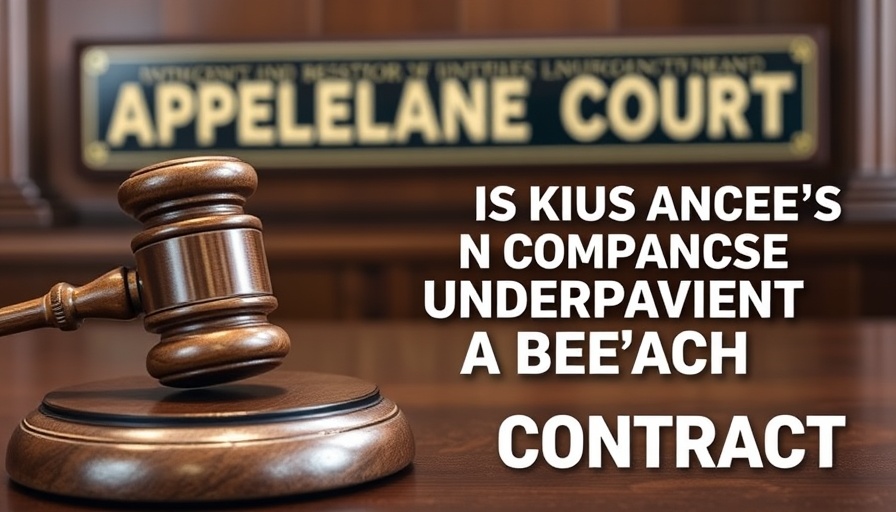
Understanding the Florida Court Decision on Insurance Underpayments
A recent ruling by Florida's First District Court of Appeal, in the case of Bailetti v. Universal Property & Casualty Insurance Company, underscores a troubling trend for policyholders dealing with underpayments from their insurers. The decision hinges on a nuanced understanding of the terms of their home insurance policy. This case raises critical questions about the obligations of insurance companies, particularly in the aftermath of property damage claims.
What Happened in the Bailetti Case?
In this case, homeowners Rodolfo Bailetti and Ana Saez filed a breach of contract suit against Universal Property after they alleged that their payout of $8,125.20 following Hurricane Sally was insufficient. Their public adjuster claimed damages exceeded $100,000, but this estimate was not presented during the trial. The appellate court sided with Universal, asserting that the insurer had paid a reasonable estimate of actual cash value (ACV) and that the homeowners failed to prove otherwise at the time of the payment.
Legal Implications for South Carolina Residents
For South Carolina residents navigating similar waters, the Bailetti ruling is particularly enlightening. It reinforces the necessity of gathering substantial evidence before taking legal action against insurers. Without timely proof that an insurer's payment was inadequate, consumers risk losing their claims altogether. For homeowners who feel shortchanged by their insurance company's offer, this precedent suggests they need to approach their claims methodically, gathering critical documentation to support their case.
The Burden of Proof: A Heavy Weight for Policyholders
This ruling shifts the burden onto policyholders to present evidence of inadequate insurance payouts, a task that can be difficult and overwhelming. As noted in the Bailetti case, estimates generated well after the initial payment may not carry weight in court. Thus, it’s crucial for policyholders to carefully document their losses and any correspondence with their insurer from the outset. This highlights the importance of effective communication with public adjusters or legal counsel during the claims process.
The High Stakes of Accurate Valuation
Given the Florida Supreme Court's ruling in the Homeowners Choice v. Clark case that emphasized the need for credible contemporaneous evidence over mere disagreements on payout amounts, homeowners must ensure they secure thorough evaluations of their damages. This is particularly pertinent following severe weather events, where the emotional burden and urgency to repair can cloud judgment.
Future Insights and Protections for Claimants
Moving forward, South Carolina policyholders must be aware of the evolving legal landscape surrounding insurance claims. The court's decision hints at a trend where insurers may adopt evasive tactics, hoping to leverage procedural defenses rather than substantial evidence. This could embolden insurance companies to underreport damages or undervalue claims, making it essential for policyholders to be vigilantly proactive in their claims.
What This Means for Your Rights as a Policyholder
The implications of the Bailetti case are profound for all those who have insurance policies. Policyholders must hold their insurance companies accountable for fair compensation. This case serves as a warning; if you believe your claim is being mishandled, it is crucial to seek legal advice and understand your rights. Knowing how to navigate the claims process and counter the tactics often employed by insurance adjusters or companies is vital to ensure fair treatment under your policy.
South Carolina residents must take charge of their claims processes to avoid potential disadvantages as exemplified by the Bailetti decision. Keep thorough records, work with trusted professionals, and do not hesitate to take action if you believe your rights are being infringed upon.
Call to Action: If you feel that your insurance company is not treating you fairly, make sure you have all necessary documentation and consider reaching out to a legal professional who specializes in insurance claims to help protect your rights. The stakes are high, and being informed is your first step towards ensuring you receive the compensation you rightly deserve.
 Add Row
Add Row  Add
Add 




Write A Comment